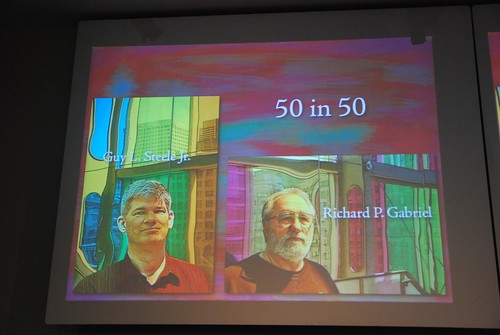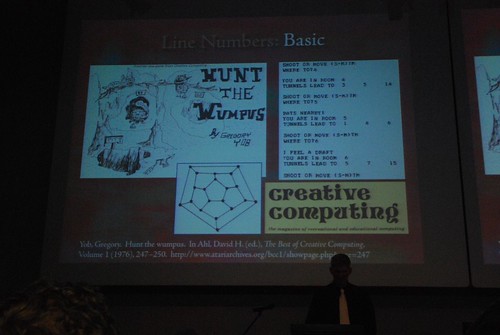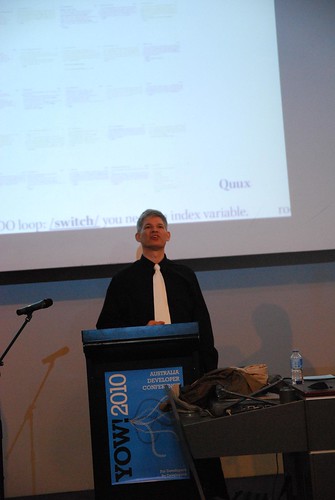Slide - Guy L Steele Jr, Richard P. Gabriel - 50 in 50 keynote - YOW 2010 Melbourne
Image by avlxyz
Keynote 50 in 50
Languages - what's to learn from them? Relics of the past; we know how to design them / to use them. Types / messages / invocation / loops / numbers / methods / big ol' libraries / lots of = signs. Heh, but what is programming, and what role do programming languages play in that process? We have learned a lot over the last five decades: organizing principles, established conventions, theory, fashions, and fads. "Those who cannot remember the past are condemned to repeat it." In this talk we survey what we think are the most important lessons of the past that future programmers, and future programming language designers, ought not forget. We illustrate each lesson by discussing specific programming languages of the past, and endeavor to shine what light we can on the future.
Keywords: Languages, Patterns, Design, Architecure, Experience
Target Audience: People not afraid of finding out just how weird our predecessors were and who enjoy theater style.
Sponsored by University of Melbourne
Speaker Information
"Richard Gabriel and Guy Steele are beasts in the world of computer science, and they are creative and witty geeks."
Guy L. Steele, Jr.
Keynote Speaker
Language Designer and Author
Fellow Sun Labs, Oracle
Links:
Websites: labs.oracle.com/projects/plrg projectfortress.sun.com
Twitter: I am not a member of Twitter. I generally deal in ideas that require paragraphs, or perhaps full-blown essays, rather than single sentences.
Books: Coders at Work The Java Language Specification Common LISP, The Language C: A Reference Manual
Richard P. Gabriel
Keynote Speaker
Distinguised Engineer IBM Research and Celebrated Philosopher of Software Creativity
Software Passion: Passionate about every dirty aspect of software creation
Links:
Website: www.dreamsongs.com/
Twitter: @rpg
Books: Performance and Evaluation of Lisp Systems Patterns of Software Innovation Happens Elsewhere Writers' Workshops and the Work of Making Things Drive on
Line Numbers - BASIC - Hunt the Wumpus - 50 in 50 keynote - YOW 2010 Melbourne
Image by avlxyz
Keynote 50 in 50
Languages - what's to learn from them? Relics of the past; we know how to design them / to use them. Types / messages / invocation / loops / numbers / methods / big ol' libraries / lots of = signs. Heh, but what is programming, and what role do programming languages play in that process? We have learned a lot over the last five decades: organizing principles, established conventions, theory, fashions, and fads. "Those who cannot remember the past are condemned to repeat it." In this talk we survey what we think are the most important lessons of the past that future programmers, and future programming language designers, ought not forget. We illustrate each lesson by discussing specific programming languages of the past, and endeavor to shine what light we can on the future.
Keywords: Languages, Patterns, Design, Architecure, Experience
Target Audience: People not afraid of finding out just how weird our predecessors were and who enjoy theater style.
Sponsored by University of Melbourne
Speaker Information
"Richard Gabriel and Guy Steele are beasts in the world of computer science, and they are creative and witty geeks."
Guy L. Steele, Jr.
Keynote Speaker
Language Designer and Author
Fellow Sun Labs, Oracle
Links:
Websites: labs.oracle.com/projects/plrg projectfortress.sun.com
Twitter: I am not a member of Twitter. I generally deal in ideas that require paragraphs, or perhaps full-blown essays, rather than single sentences.
Books: Coders at Work The Java Language Specification Common LISP, The Language C: A Reference Manual
Richard P. Gabriel
Keynote Speaker
Distinguised Engineer IBM Research and Celebrated Philosopher of Software Creativity
Software Passion: Passionate about every dirty aspect of software creation
Links:
Website: www.dreamsongs.com/
Twitter: @rpg
Books: Performance and Evaluation of Lisp Systems Patterns of Software Innovation Happens Elsewhere Writers' Workshops and the Work of Making Things Drive on
Guy L Steele Jr - 50 in 50 keynote - YOW 2010 Melbourne
Image by avlxyz
Keynote 50 in 50
Languages - what's to learn from them? Relics of the past; we know how to design them / to use them. Types / messages / invocation / loops / numbers / methods / big ol' libraries / lots of = signs. Heh, but what is programming, and what role do programming languages play in that process? We have learned a lot over the last five decades: organizing principles, established conventions, theory, fashions, and fads. "Those who cannot remember the past are condemned to repeat it." In this talk we survey what we think are the most important lessons of the past that future programmers, and future programming language designers, ought not forget. We illustrate each lesson by discussing specific programming languages of the past, and endeavor to shine what light we can on the future.
Keywords: Languages, Patterns, Design, Architecure, Experience
Target Audience: People not afraid of finding out just how weird our predecessors were and who enjoy theater style.
Sponsored by University of Melbourne
Speaker Information
"Richard Gabriel and Guy Steele are beasts in the world of computer science, and they are creative and witty geeks."
Guy L. Steele, Jr.
Keynote Speaker
Language Designer and Author
Fellow Sun Labs, Oracle
Links:
Websites: labs.oracle.com/projects/plrg projectfortress.sun.com
Twitter: I am not a member of Twitter. I generally deal in ideas that require paragraphs, or perhaps full-blown essays, rather than single sentences.
Books: Coders at Work The Java Language Specification Common LISP, The Language C: A Reference Manual
Richard P. Gabriel
Keynote Speaker
Distinguised Engineer IBM Research and Celebrated Philosopher of Software Creativity
Software Passion: Passionate about every dirty aspect of software creation
Links:
Website: www.dreamsongs.com/
Twitter: @rpg
Books: Performance and Evaluation of Lisp Systems Patterns of Software Innovation Happens Elsewhere Writers' Workshops and the Work of Making Things Drive on
No comments:
Post a Comment